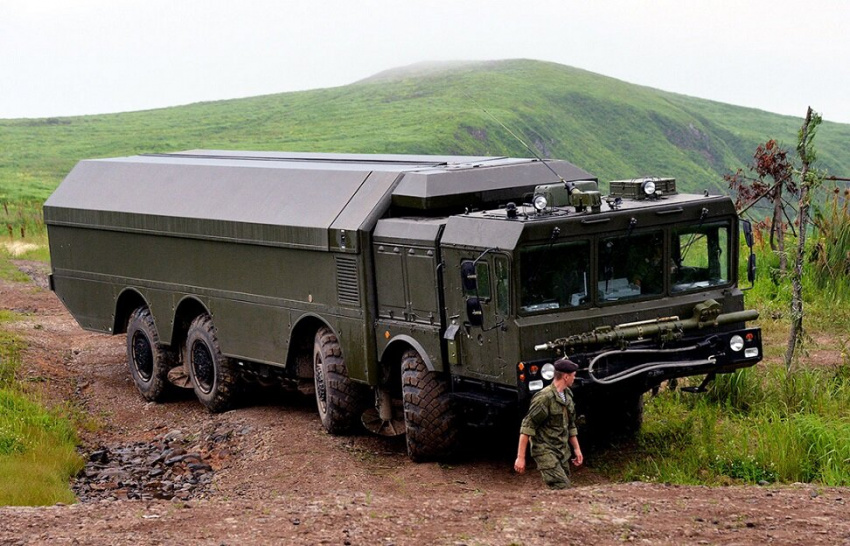Russia could defy U.S. sanctions by selling weapons to Iran

While the U.S. insists that all UN sanctions have been restored on September 20, all parties to the Joint Comprehensive Plan of Action (JCPOA), including Russia, strongly opposed the U.S. measure at the UN Security Council. Several high-ranking officials said the U.S. measure was null and void.
In a statement on September 19, U.S. Secretary of State Mike Pompeo announced the return of “all previously terminated UN sanctions” on Iran.
“Today, the United States welcomes the return of virtually all previously terminated UN sanctions on the Islamic Republic of Iran…. Sanctions are being re-imposed on Iran pursuant to the snapback process under UN Security Council resolution (UNSCR) 2231,” Pompeo said.
All participants to the JCPOA rejected the U.S. move, saying the U.S. had no legal right to resort to triggering the return of UN sanctions because it has lost the legal authority to do so after withdrawing from the 2015 nuclear deal on May 8, 2018. However, the U.S. claimed it was eligible to restore the international sanctions based on UNSCR 2231, which stipulates that “a JCPOA participant state” can reinstate the UN sanctions on Iran in case it didn’t uphold its obligations under the nuclear deal.
The U.S. resorted to the reinstatement of UN sanctions mainly to prevent the lifting of a UN arms embargo on Iran, which is due to expire in mid-October in accordance with the provisions of the JCPOA. However, the U.S. may have inadvertently undermined the UN arms embargo on Iran, because after the U.S. announced the return of UN sanctions, Russian officials called into question the arms embargo. They underlined Russia’s determination to continue military cooperation with Iran.
“We are not afraid of U.S. sanctions, we are used to them,” Russian Deputy Foreign Minister Sergei Ryabkov told reporters on Monday, a few days after the U.S. announced the restoration of UN sanctions, including the UN arms embargo. “It will not affect our policy in any way. Our cooperation with Iran is multifaceted, defense cooperation will progress depending on the two countries' needs and mutual willingness.”
“That said, another executive order will not change our approach,” the senior Russian diplomat emphasized, according to the Russian TASS news agency. Ryabkov’s comments came after Western news media reported that the White House was planning an executive order to enforce the UN sanctions.
In a clear sign that Russia would continue the military cooperation with Iran, First Deputy Head of the Federation Council Foreign Affairs Committee Vladimir Dzhabarov said Russia will continue military-technical cooperation with Iran despite U.S. President Donald Trump's executive order punishing foreign states for supplying arms to Tehran.
“So, let they impose sanctions, one less, one more of it. I believe that our military-technical cooperation with Iran will be continued, and I hope that these sanctions will not affect it," Dzhabarov told Interfax on Monday in comments on Trump's executive order.
“There are UN Security Council sanctions, and they are compulsory for fulfillment. There are sanctions of one state, namely, the U.S., which thinks for an unclear reason that they are even higher than the UN Security Council,” he added.
In addition, Russian Foreign Minister Sergei Lavrov has said there were no limitations on arms deals with Iran right from the start and after mid-October, there would be no limitations whatsoever on arms supplies to and from Iran.
“There is no such thing as an arms embargo against Iran. The Security Council, when it was adopting the comprehensive Resolution 2231, which endorsed [the] Joint Comprehensive Plan of Action, which settled the nuclear issue for Iran, and this was adopted by consensus under the chapter 7 of the United Nations’ charter,” the chief Russian diplomat said in an interview with Alarabiya’s correspondent in New York.
Lavrov added, “The Security Council in that resolution said that the supply of arms to Iran and from Iran would be subject to consideration by the Security Council and that on the 18th of October, 2020 this regime of sales to Iran would stop. There is no embargo and there would be no limitations whatsoever after the expiration of this timeframe established by the Security Council.”
In the months leading to the expiration of the UN arms embargo, some Russian media outlets showcased the weapons that Iran could purchase from Russia after the expiration of the arms embargo.
Su-30SM fighter jets, the K-300P Bastion-P mobile defense missile system, and the S-400 Air Defense System are among defense weapons that Russia could sell to Iran, according to the Russian website Russia Beyond.
“These hi-tech metal monsters from Russia could bolster Iran defenses from air and naval threats by the end of 2020, unless Iran is once again banned by the UN from purchasing weapons from abroad,” said the website in a report published in January 13, 2020.
Lavrov said there would be no limitation on arms deals with Iran by mid-October. Therefore, after October, Russia would be able to sell defensive arms to Iran. After the expiration of the UN arms embargo, there would be no legal obstacle to Russia selling weapons to Iran. It is expected that the Russians would abide by their statements.
Source: Tehran Times

